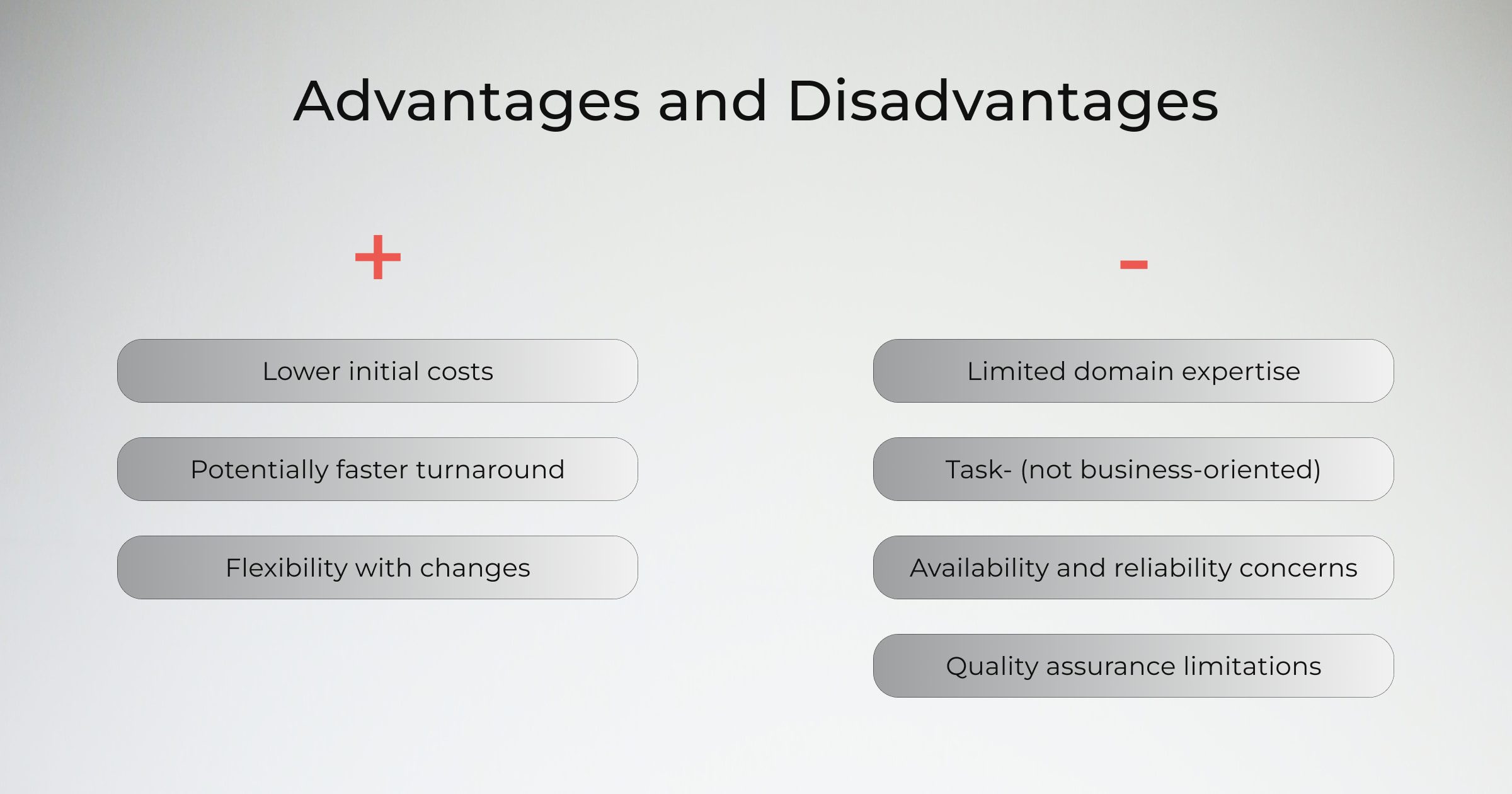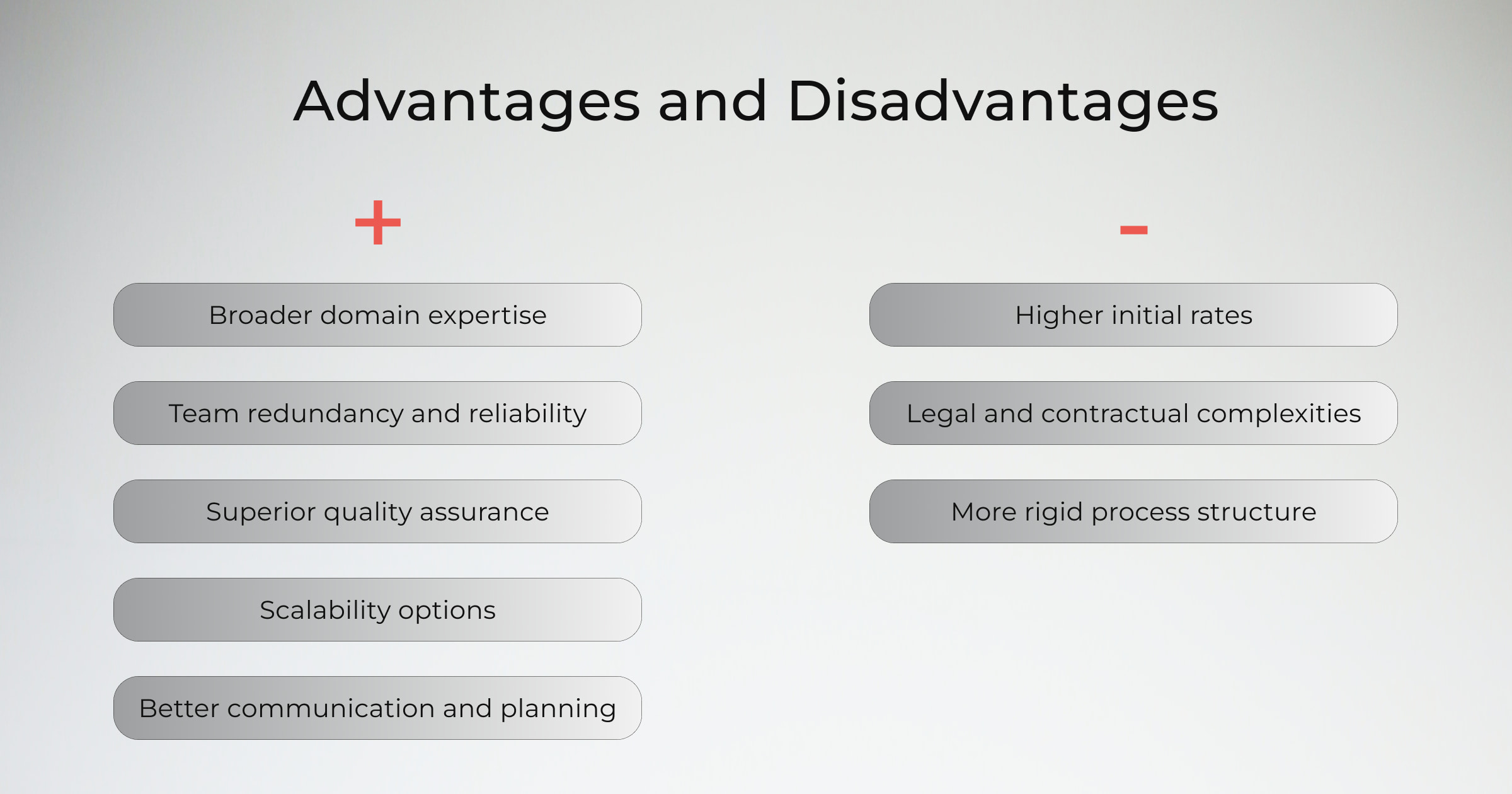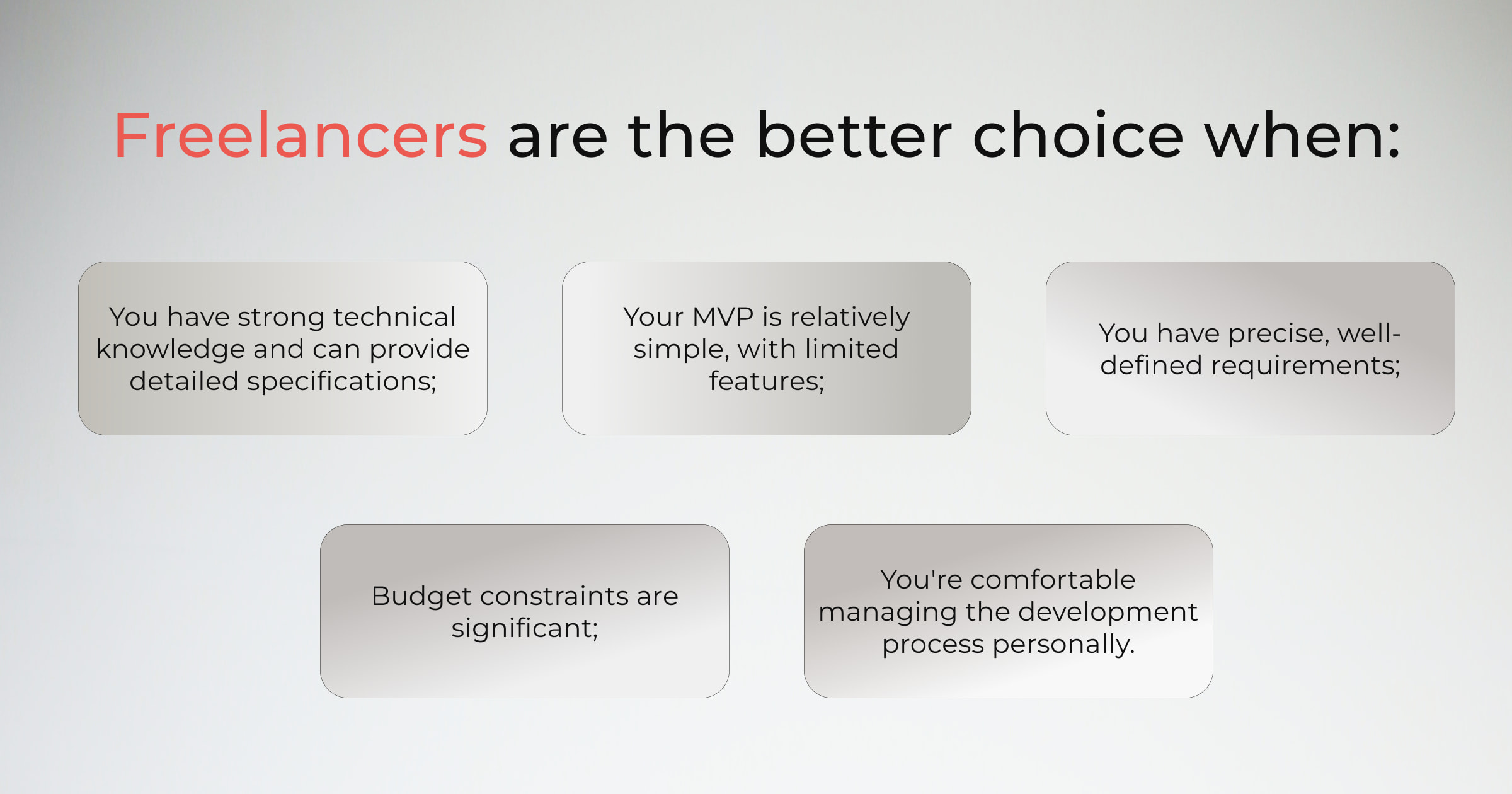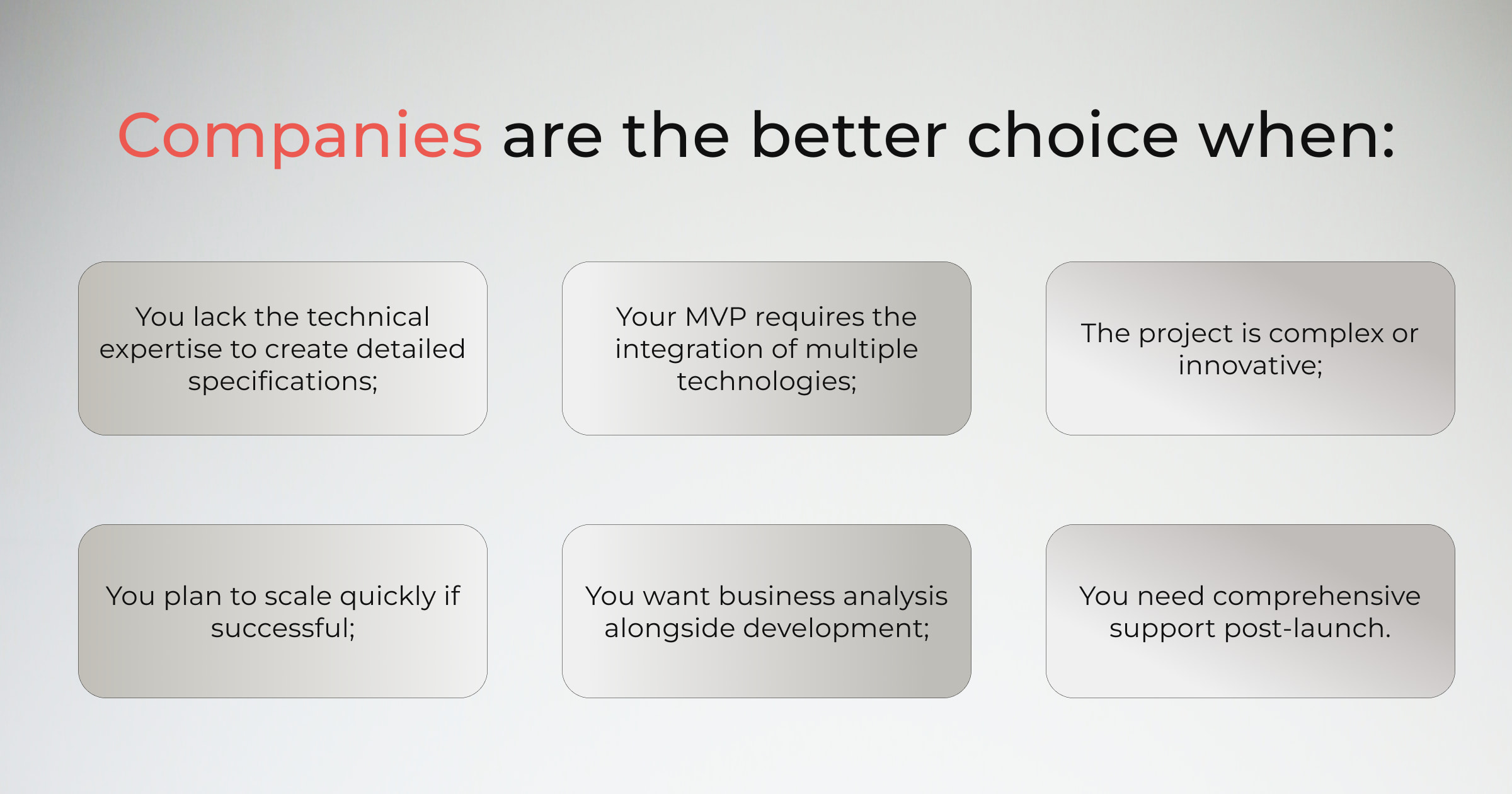
You've got a brilliant startup idea, secured initial funding, and now face your first critical decision: who should build your MVP? According to industry statistics, nearly 70% of startups experience significant delays or complete failure during this crucial phase – often due to choosing the wrong development partner.
"The biggest mistake entrepreneurs make is assuming their approach will work", Ivan Atroshchenko, Co-Founder & Chief Business Analyst at Che IT Group says. "The shortest path to testing an idea and getting real results is reducing the time from concept to a working product that solves the problem. But that's where many startup journeys derail before they even begin".
This comprehensive guide will help you navigate the crucial decision between hiring a freelancer or partnering with a development company for your MVP, with expert insights from a business analyst who's seen hundreds of projects succeed (and fail) from both sides.
Understanding MVP: Essential Concepts
Before discussing the comparison, let's clarify what an MVP truly is from a business perspective.
"MVP is a Minimum Viable Product. It primarily consists of one or several functions that will generate profit", Ivan explains. "These functions solve the key pain points of clients – they're what customers need".
The clarity of understanding what customers will pay for is a crucial indicator of MVP readiness. As Ivan notes: "If a client clearly understands what customers will pay for and what problem they're solving, that's already a good stage of MVP preparation. If it's a more general impression, we often help determine this function from both business and technical perspectives".
Common MVP Planning Mistakes
Based on years of experience with startups, Ivan identifies several critical errors that derail MVP development:
- Overconfidence in the initial concept: "The biggest global mistake is believing your approach will work. It's rarely successful on the first try – most ideas need refinement".
- Overly ambitious scope: "An idea that tries to solve too many pain points simultaneously increases team size, development time, and resource requirements significantly".
- Working with the wrong team: "You might have domain experts who aren't experienced in rapidly launching MVPs – this expertise intersection is crucial".
- Neglecting analytics during launch: "When you launch something, you must already collect data. This is perhaps the most important testing, feedback, and improvement element".
- Poor user acquisition strategy: "Even with a great product, customers might not understand or engage with it if the marketing concept is unclear or ineffective".
EXPERT TIP: identify 1-3 key functions that directly solve customer problems and generate revenue. Everything else can wait for post-MVP iterations.
Freelancers for MVP Development
Understanding freelancers' strengths and limitations is essential for making an informed decision when considering them for your MVP development.

Advantages of working with freelancers
Lower initial costs: freelancers typically offer lower hourly rates than companies, making them appear more budget-friendly.
"Freelancers can agree to work for less and deliver something cheaper", Ivan notes, though he immediately cautions that this apparent advantage comes with important caveats.
Potentially faster turnaround: with fewer process requirements and direct communication, freelancers can deliver simpler solutions more quickly.
Flexibility with changes: freelancers can make quick adjustments during development easier. As Ivan explains, "The process of making changes is faster with freelancers because there's less systematic process involved".
Disadvantages and risks
Limited domain expertise: most freelancers specialize in specific technical areas but may lack broader business understanding.
"When additional questions arise about analytics setup or architectural foundations, freelancers typically have only expertise in their specific domain. If you don't establish the right architectural foundation from the start, it becomes very expensive to change later", Ivan warns.
Task-oriented vs. business-oriented: freelancers tend to focus on completing assigned tasks rather than addressing overall business goals.
"Freelancers are more task-oriented, while companies are more business-oriented. A freelancer has more short-term goals of completing tasks, which means they don't think about business needs in their proposal. The resulting MVP may not fully address client business needs or may do so inadequately", Ivan explains.
Availability and reliability concerns: without a backup system, illness or personal issues can derail your timeline completely.
"A freelancer can get sick... Their commitment level is different. They risk their reputation, but a company risks its entire name. A freelancer can more easily abandon a project than a company can".
Quality assurance limitations: the final product may contain more issues without dedicated QA processes.
IT Companies for MVP Development
Development companies offer a structured approach to MVP creation with significant advantages and some limitations.

Key advantages
Broader domain expertise: companies provide access to specialists across multiple disciplines, resulting in better architectural decisions.
"Companies have greater expertise in the domain overall because more people work there with broader expertise. This leads to better architectural solutions", Ivan notes.
Team redundancy and reliability: if someone falls ill or leaves, the project continues without interruption.
"Reliability through personnel replacement is higher in a company. If a client doesn't like a project manager or developer or has conflicts, people can be replaced very quickly".
Superior quality assurance: dedicated testing resources ensure better product quality.
"Product quality is always better in a company due to testing".
Scalability options: companies can easily add resources if their MVP succeeds and needs to scale quickly.
"Flexibility for project expansion is better with a company because they have more people. If the MVP works, the company can expand more easily and quickly add resources to work on the project".
Better communication and planning: dedicated project managers ensure transparent planning and regular updates.
"Communication is better in a company because there are separate people for project management and planning. Transparent planning is better in a company because separate people are responsible for it".
Limitations and disadvantages
Higher initial rates: companies typically charge more per hour than freelancers.
"The initial rate at a company is always higher. But this doesn't mean the project will become more expensive or cheaper because the rate doesn't equal the final cost".
Legal and contractual complexities: corporate legal departments may cause delays in starting projects.
"Companies often have a legal department that doesn't agree to all client terms. There can be legal delays related to contract approvals".
More rigid process structure: structured development methodologies can make mid-project changes more challenging.
"Process and procedure are present in a company because a team of people works there, making it harder to change the project during development. Companies have a more extended planning phase – a plus – but making specific edits is harder because processes are more systematic".
Comparative Analysis: Freelancer vs Company
When making your decision, several key factors should be evaluated based on your specific MVP needs.
Cost factors: is cheaper really cheaper?
While freelancers typically offer lower hourly rates, this doesn't always translate to a less expensive project overall.
"Freelancers appear cheaper because their rates are lower. But this doesn't mean the project will be less expensive than with a company", Ivan emphasizes.
He elaborates on the hidden risks behind seemingly attractive pricing: "Behind this hidden low price often lies at minimum the absence of business competencies. The freelancer agrees to what the client proposes but without business analysis. The medium risk is that they underestimate the complexity of work and their capabilities. The project will be dragged out; making claims against one person or moving forward with them is difficult".
While charging higher rates, companies often deliver more predictable total costs because of their comprehensive approach: "Companies focus more on meeting client goals, and because of this, they're inclined to take a more comprehensive view of MVP problems. Company rates and a more comprehensive vision are higher, but this doesn't necessarily mean the final MVP product will be cheaper or more expensive".
Timeline and predictability
Development timelines depend heavily on project complexity, but predictability differs significantly between the two options.
"Freelancers are more about completing tasks set before them. The better you've defined the task, the higher the probability it will be completed properly. Companies are more about achieving the client's end goals – in this case, launching an MVP product that meets user needs they're willing to pay for".
This fundamental difference in approach affects the delivery timeline and the quality and business relevance of what gets delivered.
Scalability and long-term support
For ventures with growth ambitions, considering the post-MVP phase is crucial.
"A good UI, UX, product, analytics, advertising, scaling potential, and potential for MVP launch analysis – that is, working with data. The company considers all this. It looks at the task of launching an MVP from all angles. A freelancer only looks at what needs to be done and what they'll be paid for", Ivan explains.
Decision Factors: When to Choose Each Option
The optimal choice between freelancers and companies depends on your specific situation, technical expertise, and business goals.
When a freelancer is the right choice
According to Ivan, freelancers may be the better option when:
"If a person has sufficient technical experience in the domain, can set clear tasks, and understands analytics and marketing, a freelancer might be better for them. Possibly. For a specific task".

EXPERT TIP: even with freelancers, never skip the analytics setup. Ensure your MVP collects crucial user data from day one, as this will inform all future development decisions.
When a company is the better option
For more complex projects or founders without technical expertise, a company often provides better value:
"If people want to test their idea without delving into the details of the work and want external expertise from people who have already been involved in these launches, work on MVPs, understand what a product is, what a user is, advertising budget, ad testing, error correction, working with data, and as a result, launch and earn on MVP – here it's better to choose a company".

"Narrow task, more control, basic technical knowledge – that's a freelancer. Global product, its launch, analytics, scaling, troubleshooting, additional domain experience – that's a company".
Conclusions and Recommendations
Choosing between a freelancer and a development company for your MVP isn't about which option is universally better but rather which aligns with your specific needs, capabilities, and goals.
Key Considerations for Your Decision
- Assess your technical expertise honestly. A freelancer may work if you provide detailed specifications and manage development. If not, a company offers more guidance.
- Consider your MVP complexity. Simple MVPs with limited features may suit freelancers, while complex solutions benefit from a company's broader expertise.
- Evaluate your long-term plans. If rapid scaling is likely upon success, a company will provide better continuity from MVP to complete product.
- Be realistic about your budget. While freelancers appear cheaper initially, the total cost may be comparable or even higher if revisions or rebuilds are needed.
- Think about post-launch support. Companies typically offer more reliable ongoing maintenance and improvement options.
"These are two different tools", Ivan concludes. "It depends on what your goals are".
The right choice will ultimately depend on your specific situation, but with these insights, you're better equipped to make an informed decision that aligns with your MVP goals and business vision.
.png)







